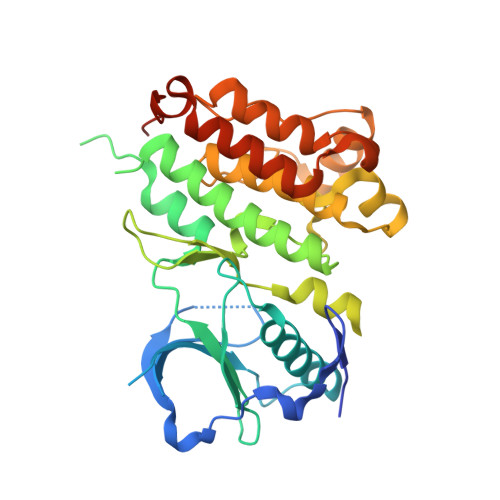Structure Based Drug Design of Crizotinib (Pf-02341066), a Potent and Selective Dual Inhibitor of Mesenchymal-Epithelial Transition Factor (C-met) Kinase and Anaplastic Lymphoma Kinase (Alk).
Cui, J.J., Tran-Dube, M., Shen, H., Nambu, M., Kung, P.P., Pairish, M., Jia, L., Meng, J., Funk, L., Botrous, I., Mctigue, M., Grodsky, N., Ryan, K., Padrique, E., Alton, G., Timofeevski, S., Yamazaki, S., Li, Q., Zou, H., Christensen, J., Mroczkowski, B., Bender, S., Kania, R.S., Edwards, M.P.(2011) J Med Chem 54: 6342
- PubMed: 21812414
- DOI: https://doi.org/10.1021/jm2007613
- Primary Citation of Related Structures:
2WGJ, 2WKM, 2XP2 - PubMed Abstract:
Because of the critical roles of aberrant signaling in cancer, both c-MET and ALK receptor tyrosine kinases are attractive oncology targets for therapeutic intervention. The cocrystal structure of 3 (PHA-665752), bound to c-MET kinase domain, revealed a novel ATP site environment, which served as the target to guide parallel, multiattribute drug design. A novel 2-amino-5-aryl-3-benzyloxypyridine series was created to more effectively make the key interactions achieved with 3. In the novel series, the 2-aminopyridine core allowed a 3-benzyloxy group to reach into the same pocket as the 2,6-dichlorophenyl group of 3 via a more direct vector and thus with a better ligand efficiency (LE). Further optimization of the lead series generated the clinical candidate crizotinib (PF-02341066), which demonstrated potent in vitro and in vivo c-MET kinase and ALK inhibition, effective tumor growth inhibition, and good pharmaceutical properties.
Organizational Affiliation:
La Jolla Laboratories, Pfizer Worldwide Research and Development, San Diego, California 92121, USA. jean.cui@pfizer.com















